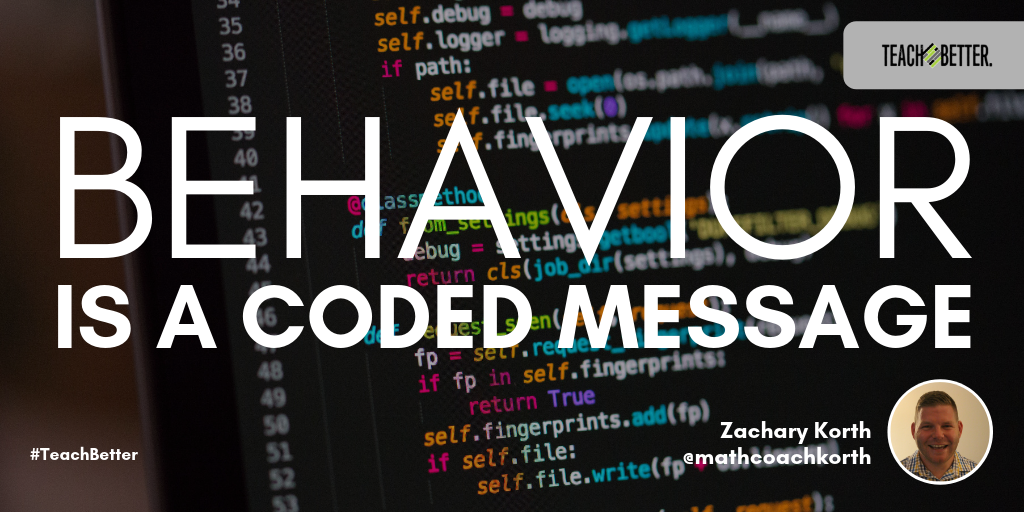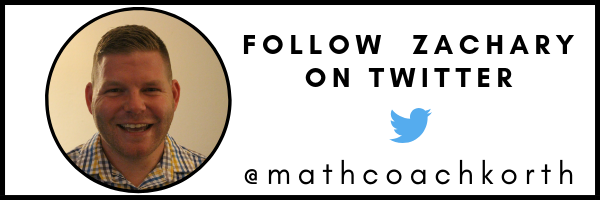In This Post:
- Behavior is a coded message, often asking us for help.
- Students ask for things in the most unloving ways.
- We need to dig into the real reasons for behavior issues.
- Authenticity is key.
- Be vulnerable.
- Check out the free resources below.
When I first started teaching about 9 years ago (I had already been in the Navy and worked in finance for Marriott) I started at a charter school on the Southside of Chicago. If you are familiar with Chicago, I taught in Englewood. This neighborhood was predominantly plagued by gun violence. That was my first introduction into trauma from a student perspective (gun shots, gang violence) I am a first generation college student who came out when I was 14 in Iowa and I have had my fair share of struggles with different situations – trauma. A majority, if not all of our students, have experienced some type of trauma. So, it should not come as a shock when our students react to situations in the most unloving ways.
I think it takes a moment or a bit of research to understand that students ask for things in the most unloving ways. Click To TweetBehavior is a coded message.
That phrase came to me when I was teaching in Portland back in 2016. At first I cringed at hearing it as some type of excuse (news flash it’s not). As I continued teaching I realized that it was a coded message. If you think about it more on a micro level, we have babies and little ones who can’t communicate what they need – all they do is scream, throw temper tantrums, and run away. Is that any different than the students we serve who are triggered by what happens in the classroom? I think it takes a moment or a bit of research to understand that students ask for things in the most unloving ways. If you ask any individual on the campus that I serve, those are my most common phrases in bold.
Students who experience a higher level of trauma have a higher stress hormone called cortisol. When a student surpasses the amount necessary to function they start to lose their ability to manage their behaviors. We call that “Flipping your Lid.” A kid flips their lid (emotions/brain function, etc.) and they can’t function, explain, relate, or however you’d like to describe it, until they calm down and all the while, they are asking for help. That’s where it is imperative to get to know your students and build relationships in an authentic way. If you are struggling, I highly suggest listening to Rita Pierson’s “Every kid needs a champion” and her discussion about human connections. You can never let a child know that you don’t like them. There are educators I have come across who say that, but then their body language speaks differently.
[scroll down to keep reading]
Authenticity and Genuine
Kids might not know sarcasm yet, but they certainly can tell when you aren’t being authentic and genuine. We must show our students that we are vulnerable. Throw in a few small things as Rita says – apologize. What if you told your students what you did over the weekend? Or better yet, ask them how their weekend was. Or, what if you bought your most challenging student lunch one day? Just out of the blue? There is a 2 minutes a day for 10 days resource below to help you get started for the new year.
I remember sitting in child study team meetings about a student’s behavior and they looked at me when I said “well I don’t see that behavior from them.” They were like why not, and I responded at the time “not sure.” I now know why. I took the time to get to know my students and really understand them. For the longest time I wore Jordans and kids took to it because they saw it as some staple of culture. Other times, I ran out and bought the student’s lunch. I tell you, half my paycheck was going to Wendy’s. But, I did what was necessary.
Now, I’m not telling you to go spend your whole paycheck at Wendy’s for students, but perhaps, if you have a really challenging student in your class, why not? Or, what if you just take additional time to sit down with the student and get to know them on a deeper level than a superficial one? But, do not force things. Do not try if your heart isn’t in it and yes, a kid will see if you are being fake or just wanting them to change their behavior. What students want to see is the real you, the genuineness of who you are.
Vulnerable
Being in a counseling role, my office is open to my students to come in and one particular student always comes to me for 6th period. He and his one-on-one walked in as I was wrapping up my crying fest. They asked if they should come back and I said no because I need student’s to see that I am human too (a male crying? what a novel idea). Mind you, this same student the year prior I had to work with. He called me the derogatory “f” word and not the cuss word. I got upset and walked away. But you know what I did next, I stayed next to him, worked with him. What was his point in that whole situation? He wanted loyalty.
He wanted to see what I would do and if I was going to be the typical teacher who just walks away and washes their hands of him. I didn’t. He now comes to me every other day and we talk about all things but also work on his studies. If you need to understand vulnerability then I suggest you see Brené Brown’s Ted Talk on Being Vulnerable.
I leave you with a couple strategies to develop relationships with your students. No one can force you to do it, and if they do then you aren’t being authentic. You need to be willing to do them.
- Be authentic, be real, and be you. No one likes a drone (unless they are flying of course)
- Go to your students’ sports games, dance, out of school events, etc.
- In the beginning of the year conduct an Interest Survey Example
- If you have nutrition plans – then get a gift card
- Be vulnerable
- What would it look like to say I’m sorry, I am not sure and not knowing everything?
- Learn about their culture
- Be present (students need consistency)
- Because I said I would (following through on promises)
- Buy them lunch or their favorite candy
- 2×10 Strategy for Behavior
- Flipping your Lid
About Zachary Korth
Zachary Korth is College and Career Facilitator in Austin, Texas. Mr. Korth has taught in Chicago, Portland and Austin but also has the background of the corporate world while working for Marriott International in a financial capacity. He also served in the United States Navy right after high school. Having a wide swath of experiences allows Mr. Korth to see the education system differently. His teaching experiences in different regions of the United States has allowed him to see different perspectives on how students learn, supports available and more importantly the achievement and opportunity gap. He has an undergraduate degree in Elementary Education from Loyola University Chicago and a Masters in Arts in Leadership from Concordia University Chicago. These experiences allows Mr. Korth to do more research on relationships and how they impact Attendance and Academic Gains. Recently, Mr. Korth was able to reduce chronic absenteeism by 70% on his campus. Mr. Korth also believes in creating relationships with community and corporations to help fund programs that serve our students.



